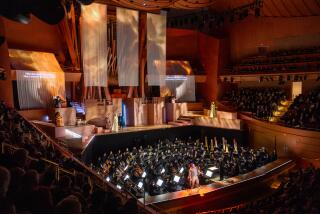‘Django Unchained’ pays homage to Wagner’s ‘Siegfried’
When Los Angeles Opera presented its new production of Richard Wagner’s “Siegfried” a few years ago at the Dorothy Chandler Pavilion, the packed house included the usual assortment of donors and local opera buffs. Nestled somewhere in the orchestra section was an odd man out: Quentin Tarantino, the filmmaker whose hyper-modern and manic sensibilities would seem at odds with slow-moving 19th century German opera.
Tarantino attended a performance of the five-hour epic as a guest of actor Christoph Waltz, who has become a semi-regular presence in the audience at the Chandler in recent years. (The Austrian-born actor studied opera and theater before embarking on a screen career.)
The production was part of L.A. Opera’s critically divisive Achim Freyer-directed “Ring” cycle that employed colorfully avant-garde visual effects to create a pictorial interpretation of the epic saga.
FULL COVERAGE: 2013 Spring arts preview
Tarantino’s feelings about “Siegfried” remain unknown, but it’s safe to say his encounter with the opera eventually helped to inspire his most recent movie, “Django Unchained,” which is available on DVD and video-on-demand this week.
“Django Unchained” is a neo-spaghetti western, but it’s plot is loosely inspired by “Siegfried,” which is the third opera in Wagner’s “Ring.” The movie follows Django (Jamie Foxx), an antebellum Siegfried, on a mission to free his beloved Broomhilda (Kerry Washington) from the clutches of a monster.
Tarantino is a filmmaker whose movies seem to be increasingly comprised of homages to other movies, but opera has not been part of his repertoire until now. “Django Unchained” takes the essence of “Siegfried” — its main characters and broad themes — and translates it to the American South, circa 1858.
“Django Unchained” makes its operatic homages obvious and easy to grasp. After freeing Django from slavery and making him his bounty-hunting partner, Dr. King Schultz (Waltz) explains the legend of Siegfried over a campfire, in a scene reminiscent of David Carradine’s Pai Mei story in “Kill Bill Vol. 2.”
PHOTOS: Hollywood stars on stage
“When a German meets a real-life Siegfried, it’s kind of a big deal,” Schultz tells his partner.
Wagner’s Siegfried is essentially an unformed mass of human clay, a muscle-bound lug without much of a brain. Likewise Django: impressively pumped and virtually monosyllabic, at least in the movie’s first third. He later reveals himself to be a shrewd survivor.
In the opera, Siegfried has a morally ambiguous mentor named Mime. Schultz serves a similar function, educating Django in the ways of the world while also using his pupil to further his own plans. And (spoiler alert) like Mime, the loquacious Schultz is violently dispatched about two-thirds through the story.
When Waltz picked up his supporting-actor Oscar in February for “Django Unchained,” he wore his opera-buff colors proudly on his tuxedo sleeve by referencing “Siegfried” in his acceptance speech.
“We participated in a hero’s journey — the hero here being Quentin,” Waltz said on stage at the Dolby Theatre. “And you scale the mountain because you’re not afraid of it. You slay the dragon because you’re not afraid of it, and you cross through fire because it’s worth it.”
Broomhilda von Shaft is possibly the only character in movie history inspired by both German opera and blaxploitation cinema. Her namesake is Wagner’s Brunnhilde, the valkyrie whom Siegfried awakens from a fire-ringed deep sleep. Tarantino repeatedly portrays Broomhilda rising from drowsy or sleep-like states, including the punitive “hot box” where she is placed by her sadistic master, Calvin Candie (Leonardo DiCaprio).
Candie is the movie’s equivalent of Wagner’s dragon, a snarling beast who guards Broomhilda on his plantation, Candyland. Stephen (Samuel L. Jackson), his scary, Uncle Tom-like servant, seems inspired by the avaricious Alberich.
Strangely for a movie so indebted to Wagner, there is no Wagner on the soundtrack. The only classical pieces are Verdi’s “Requiem,” heard during a Ku Klux Klan raid, and a solo harp version of “Fur Elise” by Beethoven.
The influence of “Siegfried” is even more apparent in a version of the “Django Unchained” screenplay that has been published online. After an appropriately epic 200-plus pages, Tarantino ends the script with the following description: “Django leaves Candyland having rescued his Broomhilda from her Mountain, her Ring of Hellfire, and all her Dragons.”
RELATED:
Opera review: ‘Siegfried’ at Los Angeles Opera
Vanger vs. Wagner? ‘Dragon Tattoo’ family has familiar ring
‘A Dangerous Method,’ ‘Melancholia’ take cues from Richard Wagner
More to Read
The biggest entertainment stories
Get our big stories about Hollywood, film, television, music, arts, culture and more right in your inbox as soon as they publish.
You may occasionally receive promotional content from the Los Angeles Times.











